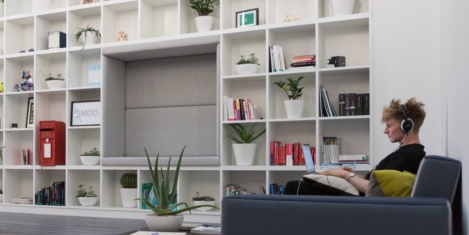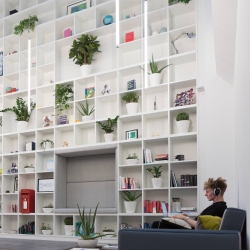To provide the best experiences, we use technologies like cookies to store and/or access device information. Consenting to these technologies will allow us to process data such as browsing behaviour or unique IDs on this site. Not consenting or withdrawing consent, may adversely affect certain features and functions.
The technical storage or access is strictly necessary for the legitimate purpose of enabling the use of a specific service explicitly requested by the subscriber or user, or for the sole purpose of carrying out the transmission of a communication over an electronic communications network.
The technical storage or access is necessary for the legitimate purpose of storing preferences that are not requested by the subscriber or user.
The technical storage or access that is used exclusively for statistical purposes.
The technical storage or access that is used exclusively for anonymous statistical purposes. Without a subpoena, voluntary compliance on the part of your Internet Service Provider, or additional records from a third party, information stored or retrieved for this purpose alone cannot usually be used to identify you.
The technical storage or access is required to create user profiles to send advertising, or to track the user on a website or across several websites for similar marketing purposes.
 As rush hour traffic returns to pre-pandemic levels and bosses call time on working from home, Stockport-based and photo ID card specialists Digital ID share a handful of expert tips to help formulate your plan, ease re-entry anxiety and safely manage employees and visitors on their return to a safe and secure workplace. (more…)
As rush hour traffic returns to pre-pandemic levels and bosses call time on working from home, Stockport-based and photo ID card specialists Digital ID share a handful of expert tips to help formulate your plan, ease re-entry anxiety and safely manage employees and visitors on their return to a safe and secure workplace. (more…)






 Workers are leaving jobs like never before, and it’s causing a shortage of talent that has companies around the globe reeling, according to a
Workers are leaving jobs like never before, and it’s causing a shortage of talent that has companies around the globe reeling, according to a 
 Research from
Research from 
 More than eight in 10 (83 percent) UK businesses say hybrid working increases the risk of a data breach, yet over a fifth (22 percent) remain unprepared if it happens, with speed of response the top concern. According to new research published within TransUnion’s Data Breach Support for Businesses
More than eight in 10 (83 percent) UK businesses say hybrid working increases the risk of a data breach, yet over a fifth (22 percent) remain unprepared if it happens, with speed of response the top concern. According to new research published within TransUnion’s Data Breach Support for Businesses 
 Socio-economic fault lines exposed by COVID-19 are creating an unforgiving marketplace, with companies under scrutiny from governments and the public and little room to avoid disputes and investigations into business practices and behavior, according to a new report from
Socio-economic fault lines exposed by COVID-19 are creating an unforgiving marketplace, with companies under scrutiny from governments and the public and little room to avoid disputes and investigations into business practices and behavior, according to a new report from 
 CEOs of the world’s largest businesses are increasingly optimistic about the outlook for their own business, according to the latest
CEOs of the world’s largest businesses are increasingly optimistic about the outlook for their own business, according to the latest 
 Culture in UK workplaces has come under scrutiny after a recent
Culture in UK workplaces has come under scrutiny after a recent 
 Older workers might choose to delay their retirement if offered the option of continuing to do their jobs working from home after the pandemic, according to
Older workers might choose to delay their retirement if offered the option of continuing to do their jobs working from home after the pandemic, according to 


 New research from
New research from 


 As SMEs emerge from the pandemic and with further changes to restrictions, it seems they have another challenge to face – the refreshed interest in and demand from employees to work in a company that meets their wellbeing needs, according to
As SMEs emerge from the pandemic and with further changes to restrictions, it seems they have another challenge to face – the refreshed interest in and demand from employees to work in a company that meets their wellbeing needs, according to 






